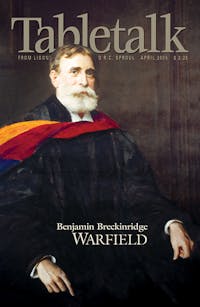
Request your free, three-month trial to Tabletalk magazine. You’ll receive the print issue monthly and gain immediate digital access to decades of archives. This trial is risk-free. No credit card required.
Try Tabletalk NowAlready receive Tabletalk magazine every month?
Verify your email address to gain unlimited access.
Pulitzer Prize-winning author John Updike has captured the common perception of B.B. Warfield in his novel In The Beauty of the Lilies. One of his central characters is a Presbyterian minister Clarence Wilmot who finds his faith badly shaken by the famous agnostic Robert Ingersoll. Wilmot is portrayed as having studied under the legendary Princeton professor who is described as an imposing figure “erect as a Prussian general, with snowy burnsides.” A similar impression was actually made concerning J. Gresham Machen as recorded in Paul Woolley’s The Significance of J. Gresham Machen Today: “Even to an ignoramus, Warfield was an impressive figure. A university freshman walking down Mercer Street would see two tall, striking figures pass him, enveloped in black overcoats and moving at a lively step. The freshman was impressed with the vigor, the determination, the solidity of the heavier one with the florid face and the most lively step. This was B.B. Warfield” (p. 21). Or again, this testimony from Francis Patton, one of Warfield’s colleagues: “Dr. Warfield was a most imposing figure. Tall, erect, with finely moulded features and singular grace and courtesy of demeanor, he bore the marks of a gentleman to his fingertips. There was something remarkable about his voice. It had the liquid softness of the South rather than the metallic resonance, which we look for in those who breathe the crisp air of a northern climate. His public utterance took the form of a conversational tone, and his sentences often closed with the suggestion of a rising inflection, as if he invited a hospitable reception from his hearers. He lacked the clarion tones of impassioned oratory, but oratory of this kind was not natural to him. He kept the calm level of deliberate speech, and his words proceeded out of his mouth as if they walked on velvet. But public speaking was not his chosen form of self-expression. He was pre-eminently a scholar and lived among his books.”
But Warfield was more than just a scholar and an academic theologian. Warfield was, by his own description of himself, a Christian devoted to serving his Lord in the training of ministers. This is perhaps nowhere more obvious than in the address he frequently gave to incoming students entitled “Spiritual Culture in The Seminary” (Selected Shorter Writings, vol. 2). He insisted, and very forcefully, that ministers needed “strenuous intellectual preparation” but added with equal emphasis the need for “profound spiritual preparation.” He would, in fact, cite the maxim bene orasse est bene studuiss (“to have studied well is to have prayed well”) and go on to explain: “When the heart is thoroughly aroused, the slowest mind starts into motion and an impulse is given it which carries it triumphantly over intellectual difficulties before which it quailed afraid. And equally a proper taste of the practical work of the ministry is a great quickener of the mind for the intellectual preparation. We cannot do without these things. And the student must be very careful, therefore — even on this somewhat low ground — while not permitting any distractions to divert him from his primary task as a student, yet to take full advantage of all proper opportunities that may arise to train his heart and hand also. Preparation for ministerial service is very much like building a machine — say a locomotive. The intellectual work may have been accomplished and the machine may stand perfect before us. But it will not go unless the vital force of devotion is throbbing through it. Knowledge is a powerful thing: and practical tact is a powerful thing. And so is a locomotive a powerful thing — provided it has steam in it! Though I know all mysteries and all knowledge, and though I bestow all my goods to feed the poor, if I have not the love of God and man welling up in invincible power beneath it all and lifting it all and transmuting it all into effective working force — it profits me nothing.”
To this end, Warfield labored to inspire his students to approach their studies with holy devotion. He directed them to the vast resources that had come from the devotional pens of a wide spectrum of Christian writers down through the centuries, but he especially recommended the Puritans, whose writings he characterized as “marked by intense devotion to duty and strong insistence on personal holiness.” Warfield’s working knowledge of this boundless storehouse of spiritual riches is truly impressive. Like his English contemporary Charles Spurgeon (whom Warfield cites in this article), Warfield lived among the Puritan divines but not to the extent that he could not appreciate even those writings he would label “Mariolatrous Romanism” (Thomas a’ Kempis) or “bald Pelagianism” (Sir Thomas Browne). “Each,” he advises, “must be read for what it can give us: and in none of them shall we seek inspiration and instruction in vain.” Wise words from one who was first and foremost a devout educator of ministers.
